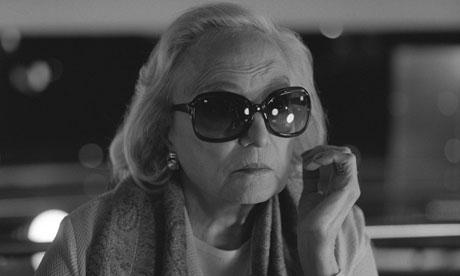Colonialism on film: how cinema finds new ways to bust an old Tabu
From June 27 to 29, 2013, the University Institute of Lisbon (ISCTE-IUL) will hold the 5th European Conference on African Studies (ECAS 2013). In parallel to the academic panels, there will be a film festival, the ECAScreenings, and a roundtable, The State of the Art: African Contemporary Cinema in Focus. BUALA is a partner of ECAScreenings in the publication of articles focused on cinema related to Africa. The articles are selected by Pedro Osório Graça.
………….
A pair of Portuguese-language films quietly examine the standoff between old Europe and modern multiculturalism
As immigration from former empires continues to change the west, a polite silence has settled in modern cinema regarding colonialism. With Pankaj Mishra and Niall Ferguson just two of the figures from other fields currently toiling to rewrite the book of the European powers’ past (mis-)adventures, film seems content to sit and wait for clear instructions on how to proceed.
 Echoes of the past … Gustavo Jahn as João and Irma Brown as Sofia in Neighbouring Sounds. Photograph Victor Juca
Echoes of the past … Gustavo Jahn as João and Irma Brown as Sofia in Neighbouring Sounds. Photograph Victor Juca
- Neighbouring Sounds (O Som Ao Redor)
- Production year: 2012
- Country: Rest of the world
- Cert (UK): 15
- Runtime: 131 mins
- Directors: Kleber Mendonça Filho
- Cast: Gustavo Jahn, Gustavo John, Irma Brown, Maeve Jinkings, Sebastião Formiga
There’s not been much colonially set cinema from the west in the past decade – because of what you might call point-of-view difficulties. These stories originally existed to bolster a sense of national identity. But even relatively balanced accounts taking in the conquerors’ perspective, such as Zulu, are problematic – and commercially unviable – now that some of the descendants of the natives are probably British citizens.
So how does colonialism fit in terms of the European story today? Treatments zeroing in approvingly on the independence movements, such as, say, Gandhi, feel more like historical records, not corresponding directly to the blurred national borders and overlapped cultural interactions of the 21st-century. How can you aspire to be British, or French, or Belgian, or Italian, or German without brushing against the violence once committed in their name?
Perhaps the answers are audible in Portuguese. A pair of recent Lusophone films – appropriately for the language with the longest colonial history – have forged ahead in finding new routes for cinema to explore the subject. They deal with colonialism not by paving over it with the atonement story of multiculturalism, or with the kind of stern rebuke Michael Haneke delivered to that ideology in Hidden; but quietly and intimately – as an invisible pressure that weighs from deep inside on present-day society, culture and, ultimately, our inner selves.
The first part of last year’s Tabu was “Paradise Lost”; set in a forlorn, present-day Lisbon in which a middle-aged Christian, Pilar, takes a neighbourly interest in the affairs of Aurora, an elderly gambling addict who indulges in mild racism towards her Cape Verdean housekeeper, Santa. When Aurora dies, and Pilar tracks down the woman’s former lover, the film’s buttoned-up realism blossoms into “Paradise”, a stylised account of the couple’s days in Portuguese Africa. The affair is conducted against a stylised backdrop that is like a cinematic stampede of past-colonial fantasies and attitudes, from FW Murnau to Tarzan escapades, to the quirk-filtered nostalgia of Wes Anderson.
 Style and stealth … Tabu, with Laura Soveral as Aurora
Style and stealth … Tabu, with Laura Soveral as Aurora
It’s the stealthy approach, suggesting how historical events fade but are internalised – both in biological and cultural memory – and involuntarily well up again, as postures, styles, stances, fashion, cinema. Or, in last week’s Brazilian release Neighbouring Sounds, in old photographs, and the enigma of the early 20th-century montage that begins Kleber Mendonça Filho’s film: shots of colonial villas, peasants tilling the land, housing and education for workers. We later learn they probably have some connection to the upland sugar mill with which Don Francisco, the patriarch who owns most of the Recife street inhabited by the film’s Short Cuts ensemble, made his fortune.
The estate is alluded to by Don Francisco’s family throughout Neighbouring Sounds as a place of escape from city pressures. It crosses entirely into the realms of reverie during a sequence in which Don Francisco’s grandson, João, pays a visit. João wanders the countryside with his girlfriend, visiting a local school, then playing make-believe usher in an abandoned cinema: organ tremors and screams from an antique horror film shriek on Filho’s soundtrack. They’re drifting into the past. Finally, they take a shower under a waterfall with his grandfather, and the waters run red over João’s head. He wakes with a start; it’s the bloody deeds of the ancestors, as we later discover. This is the sole moment where realism is ruptured fully, and something elemental bursts through the film’s compartmentalised floorplan.
Produced by the colony, rather than the coloniser, Neighbouring Sounds understandably has a more sceptical outlook on history. But it shares the same discreet approach to exploring it as Tabu; engaging in internal forensics, digging into how the past continues to shape the modern world. There’s more room for ambiguity: a recognition that colonial identities, and the power hierarchies they put into place, can be a source of sustenance, or disgust, or sometimes both. Tabu director Miguel Gomes explains his rationale to the film site Hammer to Nail: “Fiction in Portugal in the 1970s – literature, but also cinema – tried to have a very didactic approach to the topic, wagging a finger at the viewer as if he was a child. I don’t think we have to do that. For me, I take for granted that by now, people understand that colonialism was not a good system.”
Perhaps these Lusophone film-makers’ more discerning take on colonialism draws on even deeper recesses of Portuguese culture. Supposedly entering the national character during the age of discovery, when sailors, carving out the first colonies, might be away for months or years on end, the notion of saudade has a similar ambiguity: it means a sense of nostalgia or longing for an absent person or time, combining love and loss to acknowledge the inescapable pull of the past. That certainly describes Tabu, bits of Neighbouring Sounds, and the subdued fatalism they share.
A dose of saudade isn’t apt for every film about colonialism, which was responsible for plenty of real horrors that should be denounced. In any case, cinema – caught in a standoff between old Europe and its modern, multicultural face – is shying away from the subject. Feelgood films such as Untouchables make comedy out of the divide, but have difficulty boring into the complexities. Isolated film-makers such as Claire Denis still make intriguing psychological explorations of this territory, but the Lusophone brigade look as if they could be the new innovators, elegantly playing with form to spotlight old prejudices, florid fantasies and stubborn regrets. The quiet route could prove quickest to new vistas.
Tuesday 26 March 2013 17.14 GMT
from here guardian.co.uk